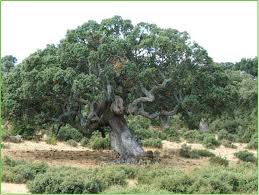So Abram Went to Live
Near the Great Trees of Mamre at Hebron
13: 18
So Abram went to live near the great trees of Mamre at Hebron DIG: Why did Abram continue to build altars wherever he went in the Land? What plot of land was near the great trees of Mamre? How was it significant to his immediate family and to his descendants (see 23:17-19)?
REFLECT: Can God call you His friend? Why or why not? What does it mean to be a friend? There is a give and take relationship among friends. As a friend, what can you give to the LORD? What could ADONAI give to you?

Still living a nomadic lifestyle, Abram moved his tents and went to live near the great trees of Mamre at Hebron (14:13, 18:1, 23:17 and 19, 25:9), twenty-two miles south of Jerusalem. These trees grow to about twenty to twenty-five feet high, have a thick trunk, heavy branches and are among the best shade trees in Canaan. Like the great tree of Moreh at Schechem (12:6), this was also a center of pagan worship, this time outside the city of Hebron. The place was named Mamre after its original owner, Mamre the Ammorite, who we will meet in 14:13. Later, from this very place, Abraham will plead for God to spare Sodom (18:1). In addition, Ephron’s field in Machpelah near Mamre, both the field and the cave in it, would eventually become the burying place for all the patriarchs (23:17-19).
Mamre signifies fatness. The original name of Hebron was Kiryat Arba, which means the town of the four. But it was later renamed Hebron for Abraham, which means friend or fellowship, because he was the friend of God (Second Chronicles 20:7; Isaiah 41:8; James 2:23). It was not until Lot had left him, when Abram was fully in the will of ADONAI, that Hebron, which means communion, fellowship or fully following the Lord, is mentioned for the first time. Disobedience hinders fully following the Lord.
When Joshua conquered the Land after forty years of wilderness wanderings, God singled out Caleb as being worthy to enter in. But because My servant Caleb has a different spirit and follows me wholeheartedly, I will bring him into the Land he went to and his descendants will inherit it (Numbers 14:24). Therefore, when Joshua was dividing up the Land he blessed Caleb and gave him Hebron. So Hebron belonged to Caleb son of Jephunneh the Kenizzite ever since because he followed ADONAI, the God of Israel, wholeheartedly (Joshua 14:13-14). Caleb fully followed the Lord; therefore, he had Hebron, or fellowship with the Lord.
Then Abram continued his custom as he built an altar to ADONAI near the great trees of Mamre. He built a true altar in a pagan place of worship. This is how Abram took possession of the Land both physically and spiritually. He would build altars to the LORD in pagan places of worship. Hebron would be his home for some time now, and he wanted a place where his family and servants could meet to worship God. Here also was where ADONAI had spoken to him and the place where he would be buried. It was especially dear to him.245
In Chapter 13 Abram is a man of peace, but in Chapter 14 Abram is a man of war. Both actions are a result of Abram’s responsibility to his nephew Lot.



Leave A Comment